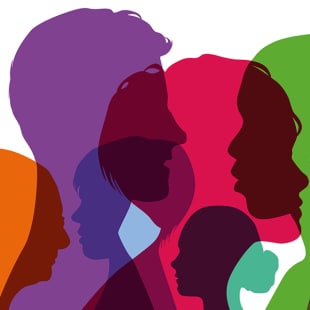Diversity & Inclusion, ensuring respect and professional equity for all within the Group
“Each time we can act to put someone at ease or allow them to be open, feel understood and fully considered, it is a step in the right direction – on this topic as for others. By creating a more favourable environment, it is quite natural that full employee commitment follows.” says Jean-Laurent Bonnafé, Chief Executive Officer of BNP Paribas.
This conviction drives the commitment of all of us in this area: no one should be left out... If they are, it’s not just an individual, but the whole company and its identity that suffer.
Caroline Courtin, Head of Group Diversity, reaffirmed this commitment in the new Agreement signed in early October: “Beyond the agreement itself, each one of us, through our benevolence and openness, can contribute to creating an inclusive environment”. This motto underlies the 2020 edition of Diversity Week.
Diversity & Inclusion is now firmly entrenched Group BNP Paribas’ founding principles
In 2006, the Group identified discrimination as “one of the 30 major operating risks for our company” and in 2011, the Group was one of the first signatories of the Women’s Empowerment Principles - a benchmark in the international work environment. The intention was followed by action when in 2013 the Group initiated the Global Diversity Committee, dedicated to Diversity & Inclusion, and then the Corporate Commitment Department in 2017. Diversity is therefore fully integrated into, and at the heart of, our Shared Convictions, Code of Conduct, Engagement Manifesto, “Raison d’Etre” and Employer Promise.
Diversity is experienced on the terrain
BNP Paribas has been fulfilling its engagement for many years throughout its internal networks and projects further afield.
Within the BNP Paribas, many initiatives encourage diversity and inclusion within the Group. Many employee networks have thus gradually become organised and continue to develop and strengthen their essential role in promoting diversity and inclusion by acting as information relays, sources of innovation and vectors for raising awareness. In 2019, more than 25,000 employees in 49 countries interacted on topics as varied as professional equality, sexual orientation, intergenerational relations, parenthood, origins, disability, inter-religious relations and veterans.
« Within the BNP Paribas, many initiatives encourage diversity and inclusion within the Group. »
Concrete examples on an every-day level
The terms Diversity and Inclusion encompass a multitude of topics that often overlap. Multiculturalism, the fight against gender discrimination and sexist violence … require action with the support of all.Concrete examples of how BNP Paribas encourages the wealth of diversity of origin include initiatives such as the Projets Banlieues, work-study programmes, the Ascenseur project in Paris or the All Abroad internal network which brings together the Group’s foreign employees working in France.
Diversity of sexual orientation and gender is also encouraged. In 2015, BNP Paribas signed the Autre Cercle charter which established best practices for fighting discrimination on grounds of sexual identity and gender. Jean-Laurent Bonnafé also signed the LGBT+ charter. These commitments are among others that are driven by the internal BNP Paribas Pride network.
More specifically, on the issue of gender equality in the workplace, the new Diversity and Inclusion Agreement raises BNP Paribas’ requirements in terms of equal pay, governance and equal treatment of male and female employees; in line with the HeforShe movement launched by the United Nations in 2014 to promote gender equality and supported by the Group.
This fight for gender equality and diversity would not be complete without an unwavering commitment to combating gender-based violence. As recently highlighted once again during the lock-down, women remain the main victims of gender-based violence. The fight against domestic and intra-family violence, and its impact in the workplace, is at the heart of BNP Paribas’ corporate approach which uses appropriate mechanisms such as a “Pôle d’Action Sociale”, especially made available during lock-down, and participates in the OneWomanInThree network. We think that companies have a real role to play and as Caroline Courtin points out, “at least one in two victims state that the violence they have suffered has an impact on their working life. Awareness-raising, training and support measures for all employees: companies can play an important role in the prevention and support of victims of domestic violence.”
Diversity policies aim to better integrate minorities so that they do not suffer from their differences by being “even more” under-represented. Historically, BNP Paribas has been a leader in a pro-active policy for the inclusion of people with disabilities. From the creation of “Mission Handicap” to the signing of agreements through the Ability internal network, the Group continuously reaffirms its support as in the latest agreement on disability.Finally, BNP Paribas strives to maintain age diversity within its network, whether by helping young people to integrate the workforce or by setting up end-of-career schemes, a step that is sometimes difficult. The new Diversity and Inclusion Agreement has a progressive retirement scheme, and beneficiaries of the skills sponsorship scheme has increased to 150 annually. Intrinsically, the Group relies on intergenerational dialogue and mutual assistance, an approach explicitly promoted by the internal network WeGenerations BNP Paribas.
Our commitment is as strong outside as it is inside the Group. And that’s what makes it so successful.


